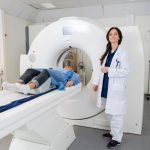Unfortunately for a large number of people around the world, lymphedema education is not provided as part of their treatment either through a medical doctor or specialists or by their rehabilitation therapists.
The good news is that more doctors are becoming aware of the options of treatment for lymphedema and are more likely to recommend their patients seek the help of a Certified Lymphedema Therapist or CLT. Patients may still have questions and misunderstanding about treatment options, but awareness is improving.
The Role of the Medical Doctor
Pre and post-surgical procedures are often referred to a CLT. However, even before the doctor makes the referral he or she may work with the patient in explaining what lymphedema is and why it is a concern.
Many people don’t seek medical help when they notice a swelling or edema and they may not understand the significance of what they are experiencing. They may also not realize that delaying treatment, including the use of compression garments and bandages, can cause serious health issues.
Doctors, including primary care physicians, need to be aware of the prevalence of lymphedema and edema and talk to their patients about treatment sooner rather than later.
The Role of the Therapist
A therapist, registered nurse, or a medical doctor may choose to become a CLT through completing a 135 hour, fully approved lymphedema certification program. This allows the professional to develop treatment plans and complete treatment for patients with lymphedema and edema caused by any medical condition.
This type of specialized lymphedema education also provides the medical professional with experience in providing a comprehensive treatment approach. This includes the use of compression garments and bandages, patient exercises, self-care practices and the use of manual lymphatic drainage (MLD) and Complete Decongestive Therapy (CDT).
At the same time, the CLT is also providing the patient with education about the condition. This helps the patient in developing more effective self-management and learning how to cope with lymphedema throughout life.
Another important component of lymphedema education includes training the family and caregivers. This time is often an opportunity for the CLT to answer questions the family members or caregiver may not feel comfortable in asking the doctor.
Education about lymphedema is an essential component of treatment. The more aware and educated everyone involved in the patient’s life is about lymphedema the more they will recognize any potential problems and seek help from a professional before serious complications occur.






